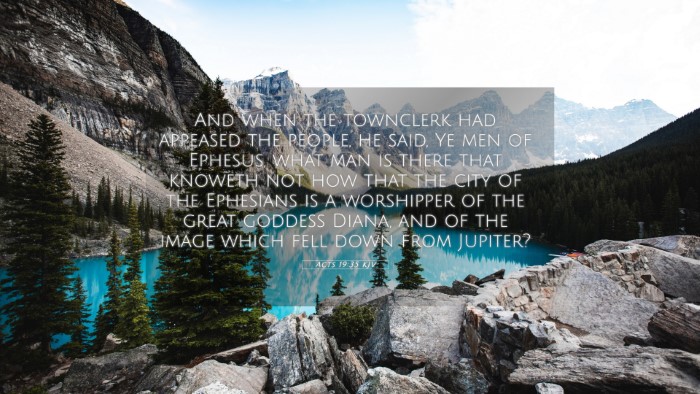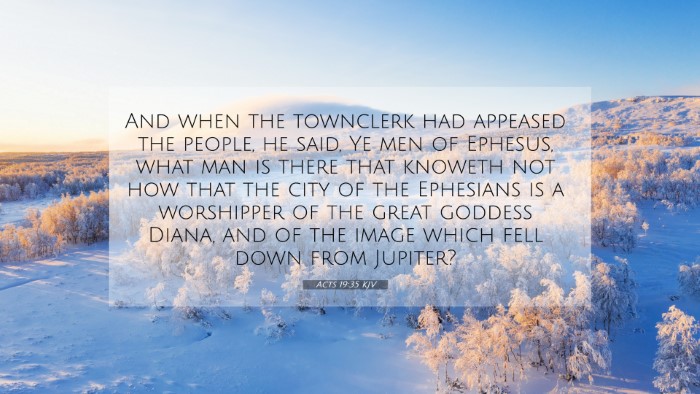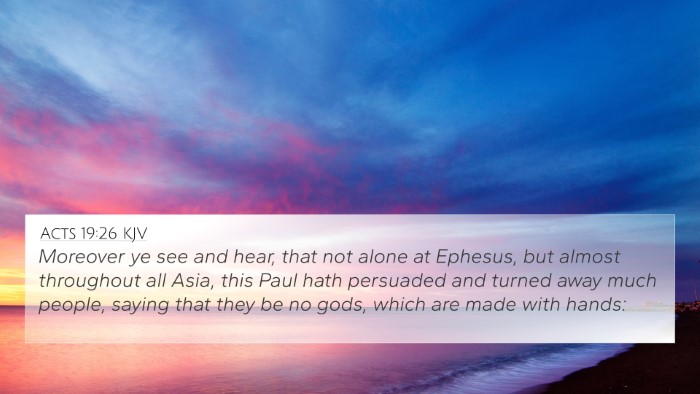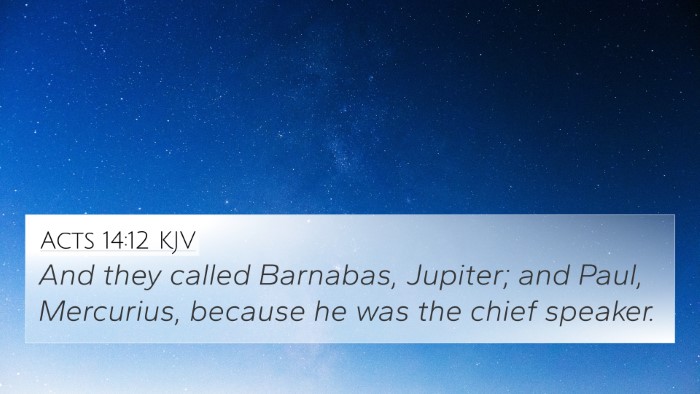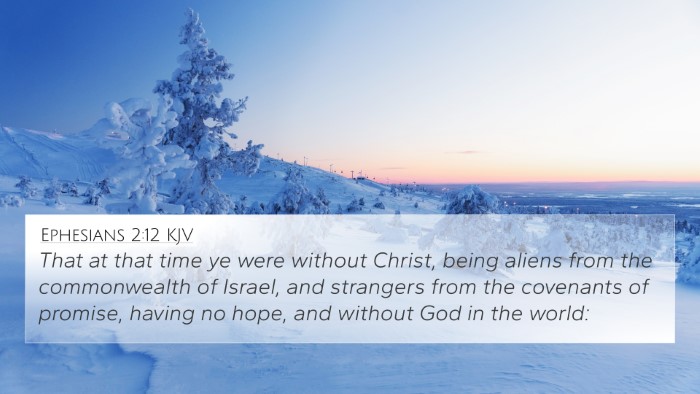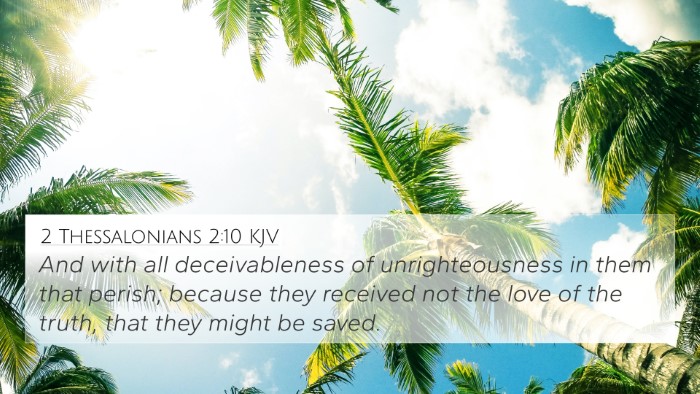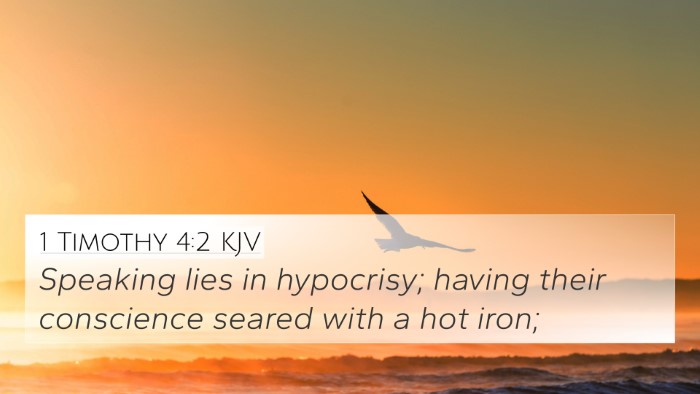Understanding Acts 19:35
Acts 19:35: "And when the town clerk had quieted the crowd, he said, 'Men of Ephesus, what man is there who does not know that the city of the Ephesians is temple-keeper of the great Artemis, and of the sacred stone that fell from the sky?'"
This verse captures a moment in Ephesus when the town clerk addresses the tumultuous crowd following the uproar caused by the silversmith Demetrius. The clerk seeks to calm the situation by reminding the citizens of their city's revered status in relation to the worship of Artemis, emphasizing their identity and the validity of their cultural reverence.
Key Themes and Insights
- Cultural Identity: The clerk appeals to the Ephesians’ pride and identity associated with their goddess, Artemis, suggesting the significance of local culture in discussions of faith and devotion.
- Authority and Order: The town clerk, as a civic leader, represents the importance of order and law during times of civil unrest, underscoring the need for calm in the face of dissent.
- Divine Influence: The reference to the "sacred stone" suggests the notion of divine signs and influences through physical objects, a prevalent motif in ancient Near Eastern religion.
Commentary Insights
Matthew Henry's Commentary
Henry emphasizes the importance of the town clerk’s role and the authority vested in him to settle disputes peacefully. He notes that true worship should transcend local customs and that the defense of faith should be rooted in rational discourse rather than emotional outbursts. This incident serves as a reminder of God’s sovereignty even within civic responsibilities.
Albert Barnes' Notes
Barnes points out the strategic wisdom of the clerk in appealing to the citizens' reverence for Artemis, showcasing the interaction between civic pride and religious devotion. He reflects on how the clerk's argument is aimed at diffusing the crowd's anger by reaffirming their long-held beliefs, valuing tradition while also appealing to common sense.
Adam Clarke's Commentary
Clarke highlights how the clerk highlights the safety of Ephesus through the city's connection to Artemis. He underscores the power of rhetoric in persuading the crowd, noting that while the mob was quick to anger against Paul and his companions, wise counsel could lead them back to a place of reason. Clarke illustrates how civic responsibility coexists with religious fervor.
Cross-References and Thematic Connections
The following Bible verses connect thematically or contextually with Acts 19:35:
- 1 Corinthians 8:4: Discusses the nature of food offered to idols, challenging the significance of idols in light of the one true God.
- Acts 17:22-23: Paul addresses the Athenians regarding their altar to an unknown god, showcasing the theme of addressing cultural beliefs respectfully.
- Acts 14:15: Paul and Barnabas address the Lystrans about worshiping mere men and not gods, reflecting on misdirected worship.
- Exodus 20:3-5: God commands the Israelites against idolatry, emphasizing His exclusive claim as the only God.
- Colossians 1:16: Affirms the preeminence of Christ over all creation, alluding to the futility of worshiping created things.
- Revelation 2:13: Mentions the seat of Satan in Pergamos, akin to civic reverence towards false deities.
- Romans 1:25: Addresses the exchange of the truth of God for a lie, resonating with the idolatry theme in Acts.
Cross-Referencing and Thematic Bible Study
Engaging in cross-referencing and exploring the connections between Bible verses can enrich one’s theological understanding and enhance personal study. Here are some practical methods:
- Utilize a Bible concordance to find key terms and their occurrences across Scripture.
- Implement a cross-reference Bible study by listing related verses and analyzing their themes together.
- Create a systematic Bible cross-reference guide that visually maps out relationships between verses surrounding specific themes.
- Explore Bible reference resources like commentaries that offer insights into cross-references and thematic connections.
Conclusion
Acts 19:35 serves as a significant case study on the intersection of local civic pride and religious fervor, illustrating the power of wise counsel amidst chaos. The insights from public domain commentaries help deepen our understanding of this verse while connecting it to broader biblical themes. Engaging with cross-references enables believers to grasp the intricacies of Scripture and facilitates a richer faith experience.

